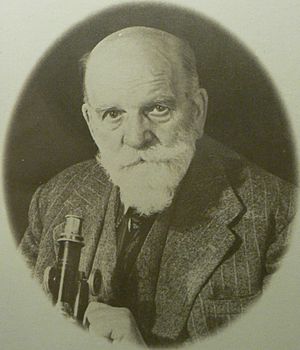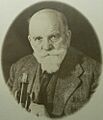Karl Jordan (zoologist, born 1861) facts for kids
Heinrich Ernst Karl Jordan (born December 7, 1861 – died January 12, 1959) was a famous German-British entomologist. An entomologist is a scientist who studies insects. He was very interested in how to group and name different kinds of butterflies, beetles, and fleas. Jordan also helped start the first International Congress of Entomology.
Contents
Karl Jordan: A Life Studying Insects
Early Life and Education
Karl Jordan was born into a farming family in Almstedt, Germany. His father passed away in 1855, so his uncle raised him. He finished school in Hildesheim and then went to Göttingen University.
After serving in the military for one year, he taught at Münden Grammar School for five years. During this time, he met zoologist August Metzger and Count Berlepsch. They helped him become even more interested in nature.
Working with the Rothschilds
Because of their recommendations, Jordan was invited to work at Walter Rothschild's museum. In 1893, he started working at Walter Rothschild's Natural History Museum at Tring. There, he became an expert in Coleoptera (beetles), Lepidoptera (butterflies and moths), and Siphonaptera (fleas).
Jordan wrote over 400 scientific papers. Many of these were written with Charles and Walter Rothschild. He discovered and described 2,575 new species of insects by himself. He also helped describe 851 more new species with the Rothschilds.
Important Contributions to Entomology
Karl Jordan was a very important figure in the world of insect study. He was inspired by other science meetings he attended in Berlin and Cambridge. This led him to start the very first International Entomological Congress. This big meeting for insect scientists happened in 1910.
In 1911, Jordan became a British citizen. He was also a member of the Royal Society, which is a group of top scientists. From 1929 to 1930, he was the president of the Entomological Society of London.
Jordan's Legacy
Karl Jordan's work is still remembered today. A type of African lizard, called Karusasaurus jordani, is named after him.
Also, in 1972, the Lepidopterists' Society created the Karl Jordan Medal. This special award is given to people who do great work studying butterflies and moths, honoring his contributions.
Images for kids
 | Selma Burke |
 | Pauline Powell Burns |
 | Frederick J. Brown |
 | Robert Blackburn |



